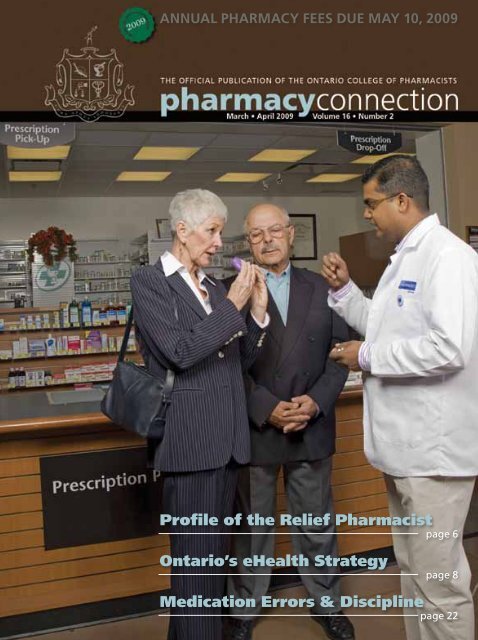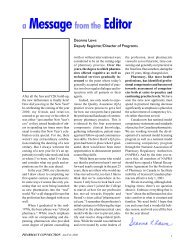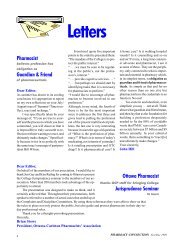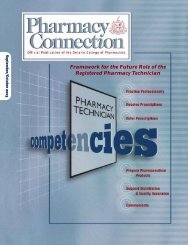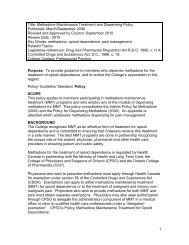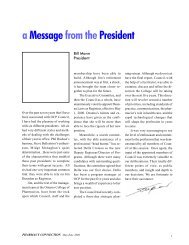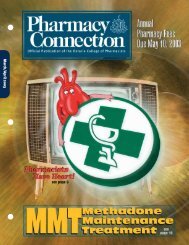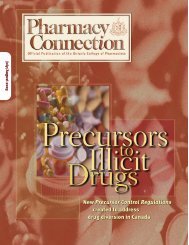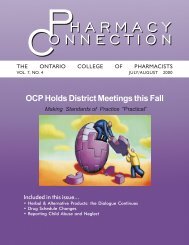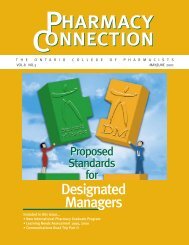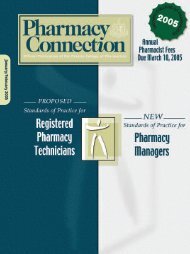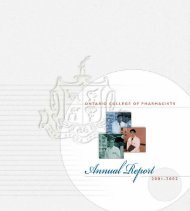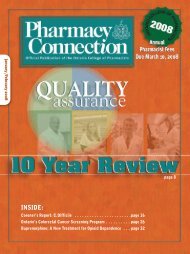Medication Errors & Discipline - Ontario College of Pharmacists
Medication Errors & Discipline - Ontario College of Pharmacists
Medication Errors & Discipline - Ontario College of Pharmacists
You also want an ePaper? Increase the reach of your titles
YUMPU automatically turns print PDFs into web optimized ePapers that Google loves.
ANNUAL PHARMACY FEES DUE MAY 10, 2009<br />
Pr<strong>of</strong>ile <strong>of</strong> the Relief Pharmacist<br />
page 6<br />
<strong>Ontario</strong>’s eHealth Strategy<br />
page 8<br />
<strong>Medication</strong> <strong>Errors</strong> & <strong>Discipline</strong><br />
page 22
ontario college <strong>of</strong> pharmacists<br />
483 Huron Street, Toronto, <strong>Ontario</strong> M5R 2R4 • Tel (416) 962-4861 • Fax (416) 847-8200 • www.ocpinfo.com<br />
The mission <strong>of</strong> the <strong>Ontario</strong> <strong>College</strong> <strong>of</strong> <strong>Pharmacists</strong> is<br />
to regulate the practice <strong>of</strong> pharmacy, through<br />
the participation <strong>of</strong> the public and the<br />
pr<strong>of</strong>ession, in accordance with standards <strong>of</strong><br />
practice which ensure that pharmacists<br />
provide the public with quality<br />
pharmaceutical service and care.<br />
Council Members<br />
Council Members for Districts 1-17 are listed below according to District number. PM indicates a public member appointed by the<br />
Lieutenant-Governor-in-Council. DFP indicates the Dean <strong>of</strong> the Leslie Dan Faculty <strong>of</strong> Pharmacy, University <strong>of</strong> Toronto.<br />
DSP indicates the Director, School <strong>of</strong> Pharmacy, University <strong>of</strong> Waterloo.<br />
1 Joseph Hanna<br />
2 Elaine Akers<br />
3 Sherif Guorgui<br />
4 Tracey Phillips<br />
5 Donald Organ<br />
6 Fayez Kosa<br />
7 Tracy Wiersema<br />
8 Saheed Rashid<br />
9 Bonnie Hauser<br />
10 Gerald Cook<br />
11 Christopher Leung<br />
12 Peter Gdyczynski<br />
13 Sanjiv Maindiratta<br />
14 Stephen Clement<br />
15 Gregory Purchase<br />
16 Doris Nessim<br />
17 Shelley McKinney<br />
PM Joinal Abdin<br />
PM Thomas Baulke<br />
PM Corazon dela Cruz<br />
PM Babek Ebrahimzadeh<br />
PM David H<strong>of</strong>f<br />
PM Margaret Irwin<br />
PM Javaid Khan<br />
PM Lewis Lederman<br />
PM Aladdin Mohaghegh<br />
PM Gitu Parikh<br />
DFP Wayne Hindmarsh<br />
DSP Jake Thiessen<br />
Statutory Committees<br />
• Executive<br />
• Accreditation<br />
• Complaints<br />
• <strong>Discipline</strong><br />
• Fitness to Practice<br />
• Patient Relations<br />
• Quality Assurance<br />
• Registration<br />
Standing Committees<br />
• Communications<br />
• Finance<br />
• Pr<strong>of</strong>essional Practice<br />
Special Committees<br />
• Standards <strong>of</strong> Practice Working Group<br />
• Pharmacy Technicians Working Group<br />
<strong>College</strong> Staff<br />
Office <strong>of</strong> the Registrar and Deputy Registrar/<br />
Director <strong>of</strong> Pr<strong>of</strong>essional Development<br />
Pharmacy Connection Editor x 241<br />
ltodd@ocpinfo.com<br />
Office <strong>of</strong> the Director <strong>of</strong> Finance<br />
and Administration x 263<br />
bhsu@ocpinfo.com<br />
Office <strong>of</strong> the Director <strong>of</strong><br />
Pr<strong>of</strong>essional Practice x 236<br />
sjackson@ocpinfo.com<br />
Registration Programs x 250<br />
jsantiago@ocpinfo.com<br />
Structured Practical Training Programs x 297<br />
vgardner@ocpinfo.com<br />
Investigations and Resolutions x 274<br />
cfernandes@ocpinfo.com<br />
Continuing Education Programs and<br />
Continuing Competency Programs x 273<br />
lsheppard@ocpinfo.com<br />
Pharmacy Openings/Closings,<br />
Pharmacy Sales/Relocation<br />
ocpclientservices@ocpinfo.com<br />
Registration and Membership Information:<br />
ocpclientservices@ocpinfo.com<br />
Pharmacy Technician Programs:<br />
ocpclientservices@ocpinfo.com<br />
Publications x 229<br />
spark@ocpinfo.com
contents<br />
Pr<strong>of</strong>ile <strong>of</strong> the Relief Pharmacist 6<br />
eHealth <strong>Ontario</strong> 8<br />
Report <strong>of</strong> the Geriatric and Long Term Care<br />
Review Committee to the Chief Coroner 10<br />
ISMP - <strong>Medication</strong> Safety in Long-Term Care 18<br />
regular features<br />
President’s Message 4<br />
Editor’s Message 5<br />
Practice Q&A 14<br />
Health Canada Notices 17<br />
Pharmacy Technician Q&A 20<br />
Close up on Complaints 22<br />
Bulletin Board 23<br />
SPT Q&A 24<br />
Deciding on <strong>Discipline</strong> 25<br />
Focus on Error Prevention - Ambiguous Prescriptions 28<br />
CE Resources 29<br />
Laws & Regulations 31<br />
pharmacyconnection<br />
March/April 2009 July • August Volume 200816 • Number Volume 215 • Number 4<br />
The objectives <strong>of</strong> Pharmacy Connection are to communicate information on <strong>College</strong> activities and policies; encourage dialogue and to discuss issues <strong>of</strong><br />
interest with pharmacists; and to promote the pharmacist’s role among our members, allied health pr<strong>of</strong>essions and the public.<br />
We publish six times a year, in January, March, May, July, September and November. We welcome original manuscripts (that promote the objectives <strong>of</strong> the<br />
journal) for consideration. The <strong>Ontario</strong> <strong>College</strong> <strong>of</strong> <strong>Pharmacists</strong> reserves the right to modify contributions as appropriate. Please contact the Associate Editor<br />
for publishing requirements.<br />
We also invite you to share your comments, suggestions, or criticisms by letter to the Editor. Letters considered for reprinting must include the author’s<br />
name, address and telephone number. The opinions expressed in this publication do not necessarily represent the views or <strong>of</strong>ficial position <strong>of</strong> the <strong>Ontario</strong><br />
<strong>College</strong> <strong>of</strong> <strong>Pharmacists</strong>.<br />
Tracy Wiersema, R.Ph., B.Sc.Phm.<br />
President<br />
Deanna Williams, R.Ph., B.Sc.Phm., C.Dir., CAE<br />
Registrar<br />
Della Croteau, R.Ph., B.S.P., M.C.Ed.<br />
Editor, Deputy Registrar,<br />
Director <strong>of</strong> Pr<strong>of</strong>essional Development<br />
dcroteau@ocpinfo.com<br />
Sue Rawlinson<br />
Associate Editor<br />
srawlinson@ocpinfo.com<br />
Agostino Porcellini<br />
Production & Design / Webmaster<br />
aporcellini@ocpinfo.com<br />
Neil Hamilton<br />
Distribution<br />
nhamilton@ocpinfo.com<br />
ISSN 1198-354X<br />
© 2009 <strong>Ontario</strong> <strong>College</strong> <strong>of</strong> <strong>Pharmacists</strong><br />
Canada Post Agreement #40069798<br />
Undelivered copies should be returned<br />
to the <strong>Ontario</strong> <strong>College</strong> <strong>of</strong> <strong>Pharmacists</strong>.<br />
Not to be reproduced in whole or in part<br />
without the permission <strong>of</strong> the Editor.
president’s message<br />
Tracy Wiersema, R.Ph., B.Sc. Phm.<br />
President<br />
Advocacy vs public interest<br />
Many members <strong>of</strong> the <strong>College</strong><br />
get confused about the role<br />
<strong>of</strong> the <strong>College</strong> in advocating<br />
for the pr<strong>of</strong>ession. The <strong>College</strong> has<br />
been established through government<br />
legislation to regulate the pr<strong>of</strong>ession in<br />
the best interest <strong>of</strong> the public. As such,<br />
the privilege <strong>of</strong> self regulation requires<br />
that all decisions be guided with public<br />
safety in mind. Our respective associations<br />
for hospital and community<br />
pharmacy, CSHP (<strong>Ontario</strong> Branch)<br />
and the <strong>Ontario</strong> <strong>Pharmacists</strong> Association,<br />
on the other hand, speak on behalf<br />
<strong>of</strong>, and advocate for the pharmacist and<br />
the pr<strong>of</strong>ession. Fortunately, many decisions<br />
that are in the best interest <strong>of</strong> the<br />
public are also in the best interest <strong>of</strong> the<br />
pr<strong>of</strong>ession <strong>of</strong> pharmacy.<br />
The current Health Pr<strong>of</strong>essions<br />
Regulatory Advisory Committee<br />
(HPRAC) submissions and reports<br />
are a good example <strong>of</strong> both public and<br />
advocacy interests being met. It is in<br />
the best interest <strong>of</strong> the public for pharmacists<br />
to be able to adapt, extend,<br />
and modify prescriptions and manage<br />
medication therapy in collaboration<br />
with other health care providers. It is<br />
also in the best interest <strong>of</strong> the pharmacist<br />
to take on this expanded role,<br />
to educate ourselves to provide medication<br />
therapy management, and to<br />
expand our role beyond dispensing <strong>of</strong><br />
medications, taking responsibility for<br />
patient outcomes.<br />
The role <strong>of</strong> the <strong>College</strong> will be to set standards for<br />
education and practice, and to have a system in place<br />
to ensure that pharmacists are carrying out these new<br />
roles safely and effectively for the public...<br />
If these new expanded roles get approved<br />
by government and legislation<br />
is put in place, the roles <strong>of</strong> the <strong>College</strong><br />
and the advocacy bodies will both be<br />
important, but different. The role <strong>of</strong><br />
the <strong>College</strong> will be to set standards for<br />
education and practice, and to have a<br />
system in place to ensure that pharmacists<br />
are carrying out these new roles<br />
safely and effectively for the public,<br />
that they are documenting their decisions<br />
and working collaboratively with<br />
other health care pr<strong>of</strong>essionals. The<br />
job <strong>of</strong> the advocacy bodies will be to<br />
promote the best use <strong>of</strong> the pharmacist,<br />
encourage and facilitate their education<br />
and training, and to advocate for<br />
their role in the workplace, not only<br />
from a scope and responsibility perspective,<br />
but also from a monetary<br />
perspective. Promotion <strong>of</strong> payment <strong>of</strong><br />
the pharmacist for these new roles will<br />
be up to the advocacy bodies in hospital<br />
and community who will represent<br />
the best interests <strong>of</strong> the pharmacists.<br />
Our pr<strong>of</strong>ession is healthier with<br />
both strong regulatory and strong advocacy<br />
bodies. Many <strong>of</strong> our goals, such<br />
as excellence in pharmacy practice,<br />
are aligned but it is important that the<br />
public interest and the interest <strong>of</strong> the<br />
pr<strong>of</strong>ession be represented by separate<br />
bodies, and that these roles be clearly<br />
distinguished for all stakeholders.<br />
4 pharmacyconnection • March/April 2009
editor’s message<br />
Della Croteau, R.Ph., B.S.P., M.C.Ed.<br />
Deputy Registrar/Director <strong>of</strong> Pr<strong>of</strong>essional Development<br />
Many pharmacists tell me<br />
that when they receive<br />
Pharmacy Connection,<br />
they turn right to the discipline cases<br />
to see who was disciplined and what<br />
they did wrong.<br />
In fact, only a very small portion <strong>of</strong><br />
reports and complaints ever go to discipline<br />
(less than 10%), and there are certainly<br />
some lessons to be learned by<br />
reading the discipline cases.<br />
If you are just reading the discipline<br />
cases in Pharmacy Connection, you<br />
are really missing out on all the practice<br />
information <strong>of</strong>fered to help you continually<br />
improve your practice. In this<br />
issue, the chair <strong>of</strong> the discipline committee<br />
has written an article to educate<br />
pharmacists about medication errors,<br />
and how to manage them so that they<br />
do not go forward to discipline. The<br />
<strong>College</strong> has published several articles<br />
from the Institute for Safe <strong>Medication</strong><br />
Practices Canada (ISMP) regarding<br />
Let us know what information is valuable to you,<br />
and what other ways the <strong>College</strong> can provide you<br />
with quality improvement information that<br />
supports your practice.<br />
medication incidents and how to prevent<br />
them. As well the focus on error<br />
prevention sites common practice<br />
errors and makes recommendations<br />
about how to prevent them from happening<br />
in the workplace.<br />
You will also see a report from<br />
ISMP examining the strengths and<br />
areas for improvement in long term<br />
care pharmacy practice. This report<br />
outlines a <strong>Medication</strong> Safety Self-Assessment<br />
(MSSA) designed specifically<br />
for multidisciplinary teams in long<br />
term care practice; a tool that you can<br />
take advantage <strong>of</strong> as a quality assurance<br />
measure. There are also considerations<br />
for the relief pharmacist<br />
and the pharmacy manager to ensure<br />
continuity <strong>of</strong> patient care and safety<br />
in the absence <strong>of</strong> regular staff. All <strong>of</strong><br />
these messages are for discussion and<br />
consideration within each pharmacy<br />
practice to ensure quality assurance<br />
<strong>of</strong> the procedures that are in place<br />
for safe and effective patient care by<br />
pharmacists and the pharmacy team.<br />
Each issue <strong>of</strong> Pharmacy Connection<br />
features a Pharmacy Practice Q&A reflecting<br />
common inquiries directed to<br />
our pharmacy practice area. There are<br />
also regular alerts from Health Canada<br />
to inform pharmacists about recalls or<br />
changes which might affect your patients<br />
directly.<br />
These and other articles are provided<br />
to update you with new developments<br />
in the pr<strong>of</strong>ession such as training<br />
requirements, regulation <strong>of</strong> pharmacy<br />
technicians, introduction <strong>of</strong> e-health<br />
initiatives, and to let you know about<br />
continuing education opportunities.<br />
Consider that reading Pharmacy Connection<br />
can be your quality assurance<br />
check on how to improve your practice,<br />
prevent common errors, and be prepared<br />
for future developments. We will<br />
be sending you an on-line questionnaire<br />
in mid-March to ask for your feedback<br />
on Pharmacy Connection. Let us know<br />
what information is valuable to you,<br />
and what other ways the <strong>College</strong> can<br />
provide you with quality improvement<br />
information that supports your practice.<br />
pharmacyconnection • March/April 2009<br />
5
elief pharmacist<br />
Pr<strong>of</strong>ile <strong>of</strong> the Relief<br />
Pharmacist<br />
Nadia Sutcliffe BScPhm, R.Ph.<br />
Inspector<br />
Due to sheer number <strong>of</strong> staffing shortages<br />
in <strong>Ontario</strong>’s numerous pharmacies,<br />
more and more pharmacies are<br />
turning to agencies or independent<br />
contractors to supply temporary or relief pharmacists to<br />
cover vacations, illnesses, and requests for time <strong>of</strong>f. There<br />
was a time when it was extremely difficult to find a licensed<br />
pharmacist for this purpose and many pharmacists went<br />
to work regardless <strong>of</strong> illness or did not take vacations. Depending<br />
on who you speak to, this situation still exists today.<br />
There are many pharmacists who do only relief work as a<br />
career choice. They enjoy the independence, flexibility <strong>of</strong><br />
shifts, travel, and variety <strong>of</strong> practices. For pharmacies needing<br />
permanent staff, this leaves a smaller pool <strong>of</strong> pharmacists<br />
to hire from, which creates staffing shortages.<br />
Most relief pharmacists are very pr<strong>of</strong>essional and take<br />
pride in their work. These practitioners are highly sought<br />
after and are <strong>of</strong>ten booked months or years in advance because<br />
<strong>of</strong> their stellar reputations. Nonetheless, some pharmacies<br />
have less than optimal experiences with relief personnel.<br />
There are stories <strong>of</strong> rudeness, lengthy personal conversations<br />
conducted on cell phones during shifts, arriving<br />
late -- or not at all, refusals to work in certain practices, and<br />
failing to counsel patients. These situations may be few and<br />
far between, but can be avoided altogether if proper steps<br />
6 pharmacyconnection • March/April 2009
are taken by all parties. Both the designated manager and<br />
relief pharmacist have specific responsibilities. They are<br />
encouraged to consult the Standards <strong>of</strong> Practice for Pharmacy<br />
Managers as well as the Standards <strong>of</strong> Practice to ensure<br />
maintenance <strong>of</strong> an ideal pr<strong>of</strong>essional working environment.<br />
The designated manager is responsible for the operation<br />
<strong>of</strong> the pharmacy. The credentials and references <strong>of</strong> any<br />
pharmacist who will be working in the dispensary should<br />
be checked – including those <strong>of</strong> relief pharmacists. The<br />
Standards <strong>of</strong> Practice for Pharmacy Managers (s.5.1) states:<br />
The manager is responsible for ensuring that all staff in the<br />
pharmacy is competent to perform duties defined by their<br />
position, including specialized functions. Certification <strong>of</strong><br />
staff may be required for some specialized functions. (Standard<br />
5.1)<br />
If the pharmacy engages in a practice which is not common<br />
to most retail pharmacies, such as a methadone maintenance<br />
program or specialty compounding, it is incumbent<br />
upon the manager to inform the relief pharmacist about this,<br />
and ensure that he or she is properly trained for, and comfortable<br />
dispensing in, these situations. It would be wise to<br />
have your pharmacy’s policies and procedures in writing, including<br />
what is expected from the staff in terms <strong>of</strong> pr<strong>of</strong>essional<br />
duties; for example, mandatory patient counselling<br />
and documentation <strong>of</strong> dialogue. The manager should also<br />
determine the relief pharmacist’s experience on the store’s<br />
computer system and provide sufficient support staff to ensure<br />
that the dispensary runs smoothly.<br />
<strong>Pharmacists</strong> working relief have certain obligations. It is<br />
incumbent upon them to learn the specifics <strong>of</strong> where they<br />
will be working, such as location, hours <strong>of</strong> operation and<br />
any specialty practices in which the pharmacist would be<br />
expected to engage which require specific training, such as<br />
the provision <strong>of</strong> methadone for MMT. A name tag or lab<br />
coat should be worn to help identify them as pharmacists,<br />
especially if the patients will not know who they are. They<br />
have an obligation to the pharmacy and to the pr<strong>of</strong>ession<br />
to uphold the standards <strong>of</strong> practice. This includes proper<br />
counselling about prescription and over-the-counter medications,<br />
documentation <strong>of</strong> dialogue, and practising in a manner<br />
which puts patient safety first. The relief pharmacist<br />
should communicate with the staff any preferences he/she<br />
may have in terms <strong>of</strong> work practices in the dispensary – it<br />
is better to be up front and avoid any miscommunication.<br />
There have been anecdotal reports <strong>of</strong> an “I’m only here for<br />
the day” attitude demonstrated during interactions with patients<br />
and staff and in general behaviour. This type <strong>of</strong> behaviour<br />
reflects poorly on the entire pr<strong>of</strong>ession <strong>of</strong> pharmacy<br />
and can ruin the reputation <strong>of</strong> the pharmacy and, indeed,<br />
<strong>of</strong> the pharmacist. The relief pharmacist is an ambassador<br />
<strong>of</strong> sorts, and should do his or her best to project a positive<br />
image <strong>of</strong> the pharmacy. Being employed by the pharmacy,<br />
even for one day, mandates an obligation to uphold the standards<br />
<strong>of</strong> the pharmacy and the pr<strong>of</strong>ession.<br />
If a problem occurs, the designated manager should make<br />
every effort to address it directly with the relief pharmacist<br />
and/or their agency to inform them <strong>of</strong> the situation. The<br />
relief pharmacist should have the opportunity to learn from<br />
the experience and receive feedback, positive or negative,<br />
as would any regular staff.<br />
Relief pharmacists provide a valuable and much-needed<br />
service in our pr<strong>of</strong>ession. It is the duty <strong>of</strong> the designated<br />
manager to make available all the support that the relief person<br />
may require, and to ensure patient safety by checking<br />
the credentials <strong>of</strong> all staff in the pharmacy and setting policies<br />
and procedures which promote all the principles <strong>of</strong> our<br />
standards <strong>of</strong> practice. The relief pharmacist should act as an<br />
ambassador <strong>of</strong> the pharmacy pr<strong>of</strong>ession, remembering that<br />
the main objective is to serve the patients and ensure optimal<br />
patient care. By keeping both the standards <strong>of</strong> practice<br />
for pharmacists and the standards <strong>of</strong> practice for pharmacy<br />
managers in mind, relief pharmacists have the opportunity<br />
to uphold the pharmacy’s pr<strong>of</strong>essional image, and to ensure<br />
that patient safety and care levels remain constant, as they<br />
would with permanent pharmacy staff.<br />
pharmacyconnection • March/April 2009<br />
7
eHealth <strong>Ontario</strong><br />
The colleges <strong>of</strong> pharmacy, medicine and nursing are working with eHealth <strong>Ontario</strong> to enable two<br />
pilot projects in the province, one in Sault Ste. Marie and the other in Collingwood.<br />
<strong>Pharmacists</strong> are encouraged to subscribe to the eHealth <strong>Ontario</strong> electronic newsletter to keep<br />
informed on these pilots and other e-health initiatives which affect pharmacy practice.<br />
Visit http://www.ehealthontario.on.ca<br />
ePrescribing: A Way to Reduce Prescription<br />
<strong>Errors</strong> and Adverse Drug Events<br />
Group Health Centre in Sault Ste. Marie and Georgian<br />
Bay Family Health Team (GBFHT) in Collingwood<br />
will be participating in the Ministry <strong>of</strong> Health<br />
and Long-Term Care, eHealth Program’s ePrescribing<br />
demonstration project. ePrescribing is the electronic<br />
generation, authorization (signature) and<br />
transmission <strong>of</strong> prescriptions from doctors / prescribers<br />
to pharmacists / dispensers. Both locations<br />
are looking towards full deployment by April 2009.<br />
Dr. James Lane <strong>of</strong> the GBFHT says: “We are excited<br />
to be participating in the Early Adopters ePrescribing<br />
Project. It will insert local pharmacies and<br />
pharmacists into the circle <strong>of</strong> care and allow electronic<br />
communication <strong>of</strong> prescriptions between prescribers<br />
and pharmacists. The beneficiaries will be<br />
patients and families who will have access to better<br />
services sooner.<br />
With ePrescribing, drug prescriptions are no longer<br />
hand-written by physicians, decreasing the chance <strong>of</strong><br />
problems associated with legibility and manual data<br />
entry. This lowers the potential for dispensing errors,<br />
which can easily result in adverse drug reactions,<br />
unnecessary hospitalization and even death.<br />
In addition, pharmacists won’t need to retype paper<br />
prescriptions, eliminating another potential source for<br />
human error. As an added benefit, electronic delivery<br />
<strong>of</strong> prescriptions to pharmacists means less wait time<br />
for patients, since prescriptions may be filled before<br />
the patient even gets to the pharmacy.<br />
Informing a Provincial Solution and<br />
Regulatory Standards<br />
Each site is implementing a different solution based<br />
on their existing technology. The results and lessons<br />
learned, particularly the impact <strong>of</strong> electronic prescribing<br />
on physicians, pharmacists and patients, will<br />
be assessed and used to inform <strong>Ontario</strong>’s provincial<br />
ePrescribing solution.<br />
In addition, regulatory colleges such as the <strong>College</strong><br />
<strong>of</strong> Physicians and Surgeons <strong>of</strong> <strong>Ontario</strong>, the <strong>Ontario</strong><br />
<strong>College</strong> <strong>of</strong> <strong>Pharmacists</strong> and the <strong>College</strong> <strong>of</strong> Nurses <strong>of</strong><br />
<strong>Ontario</strong>, are being engaged to ensure participating<br />
physicians, pharmacists and nurse practitioners are<br />
able to meet their pr<strong>of</strong>essional requirements. The<br />
findings will be shared to help determine whether any<br />
changes to pr<strong>of</strong>essional practice regulations, standards<br />
and guidelines are needed.<br />
A provincial ePrescribing solution will dramatically<br />
reduce the 400,000 preventable reactions to medication<br />
estimated to occur each year in <strong>Ontario</strong>, 4,000<br />
<strong>of</strong> which result in death.<br />
Find out more about Group Health Centre at<br />
www.ghc.on.ca and Georgian Bay Family Health<br />
Team or visit their website at www.gbfht.ca.<br />
8 pharmacyconnection • March/April 2009
<strong>Ontario</strong>’s eHealth Strategy<br />
www.ehealthontario.on.ca.<br />
eHealth <strong>Ontario</strong> is a new agency that<br />
will play the leading role in harnessing<br />
technology to improve<br />
patient care and safety.<br />
We will deliver clear, measurable and transparent results<br />
for patients and will focus on excellence in customer service,<br />
which means ensuring that priority initiatives yield results for<br />
patients and that the services to support new electronic tools<br />
and information always meet customer needs.<br />
Driven and supported by the priorities <strong>of</strong> Government, the<br />
Strategy is focused on results for three clinical priorities:<br />
• Tools to control and manage diabetes more effectively to reduce<br />
associated complications and costs;<br />
• On-line management <strong>of</strong> prescription medications to minimize<br />
preventable adverse drug events; and<br />
• Reduced waits in <strong>Ontario</strong> emergency departments and the incidence<br />
<strong>of</strong> inpatients in acute care settings waiting for alternative levels <strong>of</strong> care.<br />
<strong>Pharmacists</strong>: Keep informed on the latest developments in <strong>Ontario</strong>’s ehealth strategy;<br />
subscribe to our newsletter by visiting: http://www.ehealthontario.on.ca<br />
pharmacyconnection • March/April 2009<br />
9
coroner’s report<br />
Eighteenth Annual Report <strong>of</strong> the Geriatric<br />
and Long Term Care Review Committee to the<br />
Chief Coroner for the Province <strong>of</strong> <strong>Ontario</strong><br />
SEPTEMBER 2008<br />
T<strong>of</strong> cases referred by coroners. The committee conducts<br />
he Geriatric and Long Term Care<br />
Review Committee <strong>of</strong> the Chief<br />
coroner for the Province <strong>of</strong> <strong>Ontario</strong><br />
has completed its review<br />
an independent review <strong>of</strong> the available records relevant to<br />
the specific case and prepares a final report which includes<br />
recommendations aimed towards the prevention <strong>of</strong> future<br />
deaths in similar circumstances. The recommendations<br />
are intended to promote discussion and initiate change.<br />
The following recommendations which may be relevant to<br />
pharmacy practice in geriatric and long term care are reprinted<br />
for your information; the complete report, including<br />
examples, can be found at http://www.mcscs.jus.gov.on.ca<br />
Medical / Nursing Management<br />
• Health care pr<strong>of</strong>essionals caring for elderly residents<br />
<strong>of</strong> long term care homes should be reminded that pain<br />
is one <strong>of</strong> the most common, treatable symptoms in the<br />
elderly. Some <strong>of</strong> the principles <strong>of</strong> good geriatric pain<br />
management include the following:<br />
a) Identification <strong>of</strong> the cause <strong>of</strong> the pain,<br />
b) Regular, not PRN administration <strong>of</strong> pain medications,<br />
beginning with non-narcotic medications such<br />
as Acetaminophen, followed by narcotic medications<br />
when and if the non-narcotic medications are no<br />
longer effective,<br />
c) Regular, ongoing, careful assessment <strong>of</strong> the pain, including<br />
titration <strong>of</strong> the dosage depending on the patient’s<br />
response,<br />
d) Standardized assessment <strong>of</strong> the patient’s pain including<br />
both typical (complaints <strong>of</strong> pain), and atypical<br />
(agitation, loss <strong>of</strong> appetite), symptoms and signs,<br />
e) Utilization <strong>of</strong> physiotherapists or occupational therapists<br />
on alternative positioning in chair or bed to<br />
maximize comfort.<br />
• Health care pr<strong>of</strong>essionals should be reminded that disease<br />
presentation in the elderly is frequently atypical<br />
and may vary greatly from patient to patient. A subtle<br />
change in a patient’s clinical status may well indicate that<br />
something serious is going on which may not be readily<br />
apparent. The underlying cause(s) <strong>of</strong> these atypical<br />
presentations may be missed if the investigator does not<br />
obtain an appropriate history, conduct a thorough examination,<br />
and judiciously utilize available laboratory and<br />
imaging resources.<br />
For example, the lack <strong>of</strong> fever is not uncommon in a severely<br />
septic elderly patient.<br />
• Health care pr<strong>of</strong>essionals and all long term care homes<br />
in the Province <strong>of</strong> <strong>Ontario</strong> should be reminded <strong>of</strong> the<br />
importance <strong>of</strong> providing basic care needs to ill, elderly<br />
residents no matter where the long term care home is<br />
located in the Province. This includes evidence based<br />
assessment, pain management, and management <strong>of</strong><br />
pressure ulcers. While some long term care homes located<br />
in remote northern communities may have limited<br />
resources to manage these needs, steps should be<br />
taken to ensure that the basic care needs <strong>of</strong> their residents<br />
are met.<br />
10 pharmacyconnection • March/April 2009
• Health care pr<strong>of</strong>essionals and all long term care homes<br />
in the Province <strong>of</strong> <strong>Ontario</strong> should be reminded <strong>of</strong> the<br />
importance <strong>of</strong> developing and utilizing a comprehensive<br />
care plan to prevent and manage pressure ulcers. Not<br />
only should the care plan utilize evidence based practices,<br />
but also it should include policies and procedures<br />
to systematize these practices whenever possible. The<br />
importance <strong>of</strong> involving the entire health care team, including<br />
physicians in the prevention and management <strong>of</strong><br />
pressure ulcers, cannot be overemphasized.<br />
Communication and Documentation<br />
• Health care pr<strong>of</strong>essionals should be reminded <strong>of</strong> the importance<br />
<strong>of</strong> keeping complete, comprehensive, and accurate<br />
progress notes regarding treatment decisions and<br />
assessments. Frequently, the Committee finds these<br />
notes to be absent, scanty, incomplete, irrelevant, inaccurate,<br />
and/or illegible. These notes should meaningfully<br />
reflect issues identified by all members <strong>of</strong> the health<br />
care team (including the family) and include the reason<br />
why certain treatments are/are not being done in relation<br />
to these issues.<br />
Institutions need to develop quality assurance programs<br />
in order to determine their level <strong>of</strong> compliance with these<br />
programs and to correct any deficiencies where present.<br />
• Health care pr<strong>of</strong>essionals should be reminded that family<br />
members are a vital member <strong>of</strong> the health care team.<br />
Family members’ concerns and observations should<br />
be acknowledged, taken seriously, and responded to<br />
in a timely fashion. The importance <strong>of</strong> documenting<br />
family interactions reflecting serious concerns cannot be<br />
overemphasized.<br />
• Health care pr<strong>of</strong>essionals should be reminded <strong>of</strong> the importance<br />
<strong>of</strong> good communication amongst ALL members<br />
<strong>of</strong> the health care team including family members<br />
in situations where a patient’s clinical condition suddenly,<br />
unexpectedly, and unexplainably changes, and/<br />
or when family members have expressed concerns regarding<br />
the patient’s clinical course. The importance<br />
<strong>of</strong> documenting the information communicated, and<br />
with whom the communication has occurred, cannot be<br />
overemphasized.<br />
• Health care pr<strong>of</strong>essionals should be reminded <strong>of</strong> the<br />
importance <strong>of</strong> communicating with patients, if competent,<br />
and/or family members and/or substitute decision<br />
makers, the need for various treatment modalities<br />
and what alternatives exist to the recommended<br />
treatment modalities. Documentation <strong>of</strong> the information<br />
exchange on the medical record should be<br />
mandatory.<br />
• Health care pr<strong>of</strong>essionals should be reminded <strong>of</strong> the importance<br />
<strong>of</strong> communication with families regarding severely<br />
behaviourally challenged demented elderly family<br />
members, especially about the potential risks and benefits<br />
<strong>of</strong> available treatment interventions including the use<br />
<strong>of</strong> psychotropic medications.<br />
• Health care pr<strong>of</strong>essionals and all long term care homes in<br />
the Province <strong>of</strong> <strong>Ontario</strong> should be reminded <strong>of</strong> the importance<br />
<strong>of</strong> good communication with family members<br />
during an outbreak situation when visiting restrictions<br />
are imposed. A plan <strong>of</strong> action should be in place to maximize<br />
communication during the outbreak.<br />
Use <strong>of</strong> Drugs in the Elderly<br />
• Health care pr<strong>of</strong>essionals should be reminded <strong>of</strong> the<br />
importance <strong>of</strong> ensuring that elderly patients who<br />
require opiates or other proconstipatory medications,<br />
are placed on a well defined bowel management<br />
protocol which includes careful monitoring to<br />
avoid the development <strong>of</strong> constipation and potential<br />
serious risk for the development <strong>of</strong> obstipation and<br />
obstruction.<br />
• Health care pr<strong>of</strong>essionals should be reminded that constipation<br />
is an almost always universal complication <strong>of</strong><br />
narcotic analgesics in the elderly. The development <strong>of</strong><br />
constipation should be anticipated and steps taken to<br />
prevent and manage it every time a prescription is written<br />
for a narcotic analgesic.<br />
• Health care pr<strong>of</strong>essionals should be reminded <strong>of</strong> the importance<br />
<strong>of</strong> ordering a serum albumin when assessing<br />
drug levels <strong>of</strong> highly protein bound medications such as<br />
Phenytoin Sodium.<br />
pharmacyconnection • March/April 2009<br />
11
pharmacy accreditation renewals 2009<br />
There has been no increase in Pharmacy fees for 2009<br />
Your annual pharmacy accreditation renewal fee <strong>of</strong> $810.31 * is due no later than<br />
May 10, 2009. Renewal forms will be mailed to each pharmacy by mid-March<br />
While the pharmacist annual renewal has moved online, the pharmacy accreditation renewal process remains paper-based.<br />
Why? The information on the accreditation renewal form and any changes made to it must be acknowledged, currently - by<br />
way <strong>of</strong> signature - by all Directors and the Designated Manager <strong>of</strong> each pharmacy.<br />
FEE PAYMENTS<br />
Annual Pharmacy Fees due May 10, 2009<br />
Pharmacy fees <strong>of</strong> $810.31 ($771.72 + $38.59 GST) must be<br />
received and/or postmarked no later than May 10.<br />
Paying by Cheque<br />
Make sure your cheque is signed and made payable to<br />
the <strong>Ontario</strong> <strong>College</strong> <strong>of</strong> <strong>Pharmacists</strong> or OCP in the amount<br />
<strong>of</strong> $810.31 ($771.72 + $38.59 GST). Please write your<br />
Pharmacy Accreditation number and Invoice number on<br />
the front <strong>of</strong> your cheque.<br />
NSF cheques are treated as late and incur both a late<br />
penalty fee and a $20 NSF service charge. All unsigned<br />
cheques will be returned for signature.<br />
Paying by Credit Card<br />
We accept payment by VISA, MasterCard or American<br />
Express. Enter your credit card number and the expiry date<br />
<strong>of</strong> your credit card in the box under Payment Information<br />
on your renewal form. Please be sure to sign the credit<br />
card section giving us authorization to process the credit<br />
card payment in the amount <strong>of</strong> $810.31.<br />
RECORDS UPDATE<br />
Updates are required for<br />
the following:<br />
• Which pharmacists<br />
(with and without<br />
signing authority), and<br />
technicians are practising<br />
at the pharmacy<br />
• Lock and leave practices<br />
• Methadone dispensing<br />
• Pharmacy website information<br />
• Indication <strong>of</strong> which <strong>of</strong> the <strong>College</strong>-approved Drug<br />
Information Services the pharmacy subscribes to<br />
As outlined in the Standards for Designated Managers,<br />
acknowledgement <strong>of</strong> all directors and designated<br />
managers is a requirement <strong>of</strong> every pharmacy when<br />
reporting a designated manager change. You can update<br />
this information on the renewal form or download the<br />
Acknowledgment/Change <strong>of</strong> Designated Manager form by<br />
clicking on the “college forms” link at the bottom <strong>of</strong> our<br />
home page at www.ocpinfo.com<br />
Once processed, the certificates <strong>of</strong> accreditation and<br />
income tax receipts are mailed to the Pharmacy.<br />
LATE PAYMENTS<br />
Late payments are subject to a late payment fee <strong>of</strong> $105<br />
($100 + $5 GST) (if paid within 30 days after the due date)<br />
or $157.50 (if paid more than 30 days after the due date).<br />
This includes cheques that are received early but postdated<br />
after May 10, 2009. Late payments are not processed until<br />
the late payment fee has been received.<br />
*All fees listed above include GST.<br />
For further information contact:<br />
Client Services at (416) 962-4861 Ext. 300 or by email at<br />
ocpclientservices@ocpinfo.com<br />
12 pharmacyconnection • March/April 2009
moving forward with technology<br />
With the successful launch <strong>of</strong> the Online Pharmacist Fee Renewal in January, we are<br />
monitoring member reaction to this new platform, as we continue to evaluate ways to<br />
improve <strong>College</strong> and Member processes through the use <strong>of</strong> technology.<br />
The online process has accelerated renewals significantly. We are pleased to report that<br />
as <strong>of</strong> February 19, 2009, 45% <strong>of</strong> pharmacists have completed Step 1 (the information<br />
renewal portion <strong>of</strong> their annual renewal), two thirds <strong>of</strong> which have also completed Step<br />
2 (payment). This compares very favourably to last year, when only 17% <strong>of</strong> pharmacists<br />
had completed their information renewal and payment as <strong>of</strong> the same date.<br />
Members share their first experience with<br />
the new online renewal process:<br />
“I called last week to complain about the new renewal process. I just completed it and<br />
it was really easy, so I wanted to apologize for complaining last week.”<br />
“Oh my goodness... I did it! I can’t wait to tell my grandson - he’ll be so proud <strong>of</strong> me.”<br />
“I’m uncomfortable with the new technology adopted by the college.... members should<br />
be given the choice to do their renewal online or by paper”.<br />
One member had Client Services walk him through the new online renewal process.<br />
Although he expressed his annoyance throughout the process, once he completed it, he<br />
said “This wasn’t so bad...now I’ll be able to help my wife complete her annual renewal !”.<br />
Stay tuned . . .<br />
We will continue to keep you informed about the success <strong>of</strong> this process as well<br />
as other initiatives the <strong>College</strong> is undertaking, to develop enhanced solutions<br />
through the use <strong>of</strong> technology.<br />
pharmacyconnection • March/April 2009<br />
13
practice Q&A<br />
Greg Ujiye, R.Ph., B.Sc.Phm.<br />
Pr<strong>of</strong>essional Practice Advisor<br />
QCan you clarify whether prescriptions and<br />
refills for all controlled substances expire or<br />
are no longer valid after one year, or only those for<br />
benzodiazepines and targeted substances?<br />
<strong>Pharmacists</strong> frequently ask for clarification on this issue. It<br />
is only prescriptions for benzodiazepines and targeted substances<br />
which expire or are no longer valid after one year<br />
from the date the prescription was written. In addition, refills<br />
are no longer valid if one year has elapsed from the time<br />
the prescription was written. It is important to emphasize<br />
that the year counts from the time the prescription was<br />
written by the prescriber and not from when the prescription<br />
was first dispensed.<br />
This requirement is found in s.52(c) <strong>of</strong> the Benzodiazepine<br />
and Targeted Substances Regulation. The Food and<br />
Drugs Regulation, Part G - Controlled Drugs places no such<br />
restriction or requirement on controlled drugs.<br />
QWhat is the difference between a controlled drug<br />
and a controlled substance?<br />
These terms are defined and discussed in two different<br />
Acts.<br />
A “controlled drug” is defined in the Food and Drugs Regulation,<br />
Part G – Controlled Drugs and is any drug (or preparation)<br />
listed in Parts I, II, and III <strong>of</strong> the Schedule to Part G.<br />
A “controlled substance” is defined in the Controlled<br />
Drugs and Substances Act (CDSA) and refers to any substance<br />
listed in Schedule I, II, III, IV, and V <strong>of</strong> the CDSA.<br />
These Schedules include controlled drugs, narcotics, benzodiazepines<br />
and targeted substances.<br />
The term “controlled substance” refers to all drugs and<br />
substances covered by the CDSA and encompass all activities<br />
related to the control <strong>of</strong> those drugs and substances.<br />
The definitions for “narcotic,” “benzodiazepine and targeted<br />
substance” are found in their specific regulation to<br />
the CDSA.<br />
QWe occasionally receive a notice that a physician<br />
is restricted from prescribing controlled drugs<br />
and narcotics. Does this include benzodiazepines and<br />
targeted substances?<br />
No. “Controlled drug” and “narcotic” are defined terms.<br />
In such cases the physician is restricted from prescribing<br />
controlled drugs listed in Parts I, II, and III <strong>of</strong> the Food and<br />
Drug Regulation, Part G-Controlled Drugs or narcotics found<br />
in the Schedule to the Narcotic Control Regulations. The<br />
physician is free to prescribe benzodiazepine and targeted<br />
substances. If the notice states the physician is restricted<br />
from prescribing controlled substances then the physician is<br />
not allowed to prescribe controlled drugs, narcotics, benzodiazepines<br />
or targeted substances.<br />
QWhere can I get a new narcotic register to record<br />
my controlled drug and narcotic purchases?<br />
<strong>Pharmacists</strong> can download new pages in either a PDF or<br />
Word document from the OCP website. Click on the menu<br />
bar item “<strong>College</strong> Forms” at the bottom <strong>of</strong> the webpage.<br />
Choose either the PDF or Word document <strong>of</strong> “Pharmacy<br />
Narcotic and Controlled Drug Register” on the screen that’s<br />
displayed.<br />
14 pharmacyconnection • March/April 2009
QTo fill or not to fill?<br />
To fill or not to fill? That is the question! What is the status <strong>of</strong> prescription refills when the prescribing physician is deceased<br />
or has moved away, or when the physician’s license has been suspended or revoked? The Practice Advisory staff continues<br />
to receive numerous inquiries regarding the status <strong>of</strong> prescription refills once the status <strong>of</strong> a physician’s license changes. The<br />
chart below provides some guidelines for action which may reduce confusion in the future.<br />
Physician Deceased<br />
Physician Moved<br />
Physician Retired<br />
Physician’s License<br />
Physician’s Licensed<br />
(out <strong>of</strong> Canada)<br />
Suspended<br />
Revoked<br />
• License not<br />
• License maintained<br />
maintained<br />
Refills are invalid<br />
Refills are invalid<br />
Refills valid for 1 year<br />
Refills are invalid<br />
Refills are invalid<br />
Use pr<strong>of</strong>essional<br />
Use pr<strong>of</strong>essional<br />
Any script written<br />
Any script written<br />
judgment**<br />
judgment<br />
prior to the date <strong>of</strong><br />
prior to the date <strong>of</strong><br />
suspension would be<br />
revocation would be<br />
valid.<br />
valid.<br />
Refer patient to new<br />
Refer patient to new<br />
physician or walk-in<br />
physician or walk-in<br />
Use pr<strong>of</strong>essional<br />
Use pr<strong>of</strong>essional<br />
clinic<br />
clinic<br />
judgment<br />
judgment<br />
Refer patient to new<br />
Refer patient to new<br />
physician or walk-in<br />
physician or walk-in<br />
clinic<br />
clinic<br />
• License not<br />
maintained<br />
Refills are invalid<br />
Use pr<strong>of</strong>essional<br />
judgment<br />
Refer patient to new<br />
physician or walk-in<br />
clinic<br />
** As summarized above, if the physician is deceased or if his or her license has been suspended or revoked; a pharmacist may<br />
use pr<strong>of</strong>essional judgment to determine when it is appropriate to provide a refill or direct the patient to consult another prescriber.<br />
Pr<strong>of</strong>essional judgment may be used where all reasonable options to obtain proper authorization have been exhausted. In order to<br />
ensure the continuity <strong>of</strong> patient care, and provided the patient’s condition appears stable. As always, pharmacists are accountable<br />
for their actions, and should document accordingly as per the Documentation Guidelines.<br />
pharmacyconnection • March/April 2009<br />
15
online survey<br />
Here’s your chance to<br />
Speak up about<br />
Pharmacy Connection!<br />
The Editor asks…<br />
“What do you REALLY THINK about your pr<strong>of</strong>ession’s journal?“<br />
We invite you to take a moment to complete a brief online survey to help the <strong>College</strong><br />
understand your thoughts, opinions, and reading habits <strong>of</strong> Pharmacy Connection – and your<br />
“wish list” too, as we look for ways to bring our members more practice-relevant information<br />
through this publication.<br />
Sample questions :<br />
• What articles do you find most interesting and valuable?<br />
• What topics would you like to read more about?<br />
• What improvements would you like to see in Pharmacy Connection?<br />
• Do you prefer to receive this publication in a print or electronic version?<br />
An invitation with a link to the survey will be emailed to you mid-March.<br />
Thank you –<br />
Your thoughts and suggestions will inform future editorial content, design and distribution.<br />
Survey highlights will be published in a future issue <strong>of</strong> Pharmacy Connection.<br />
16 pharmacyconnection • March/April 2009
health canada advisories & notices<br />
Feb 18, 2009<br />
Feb 17, 2009<br />
Feb. 17, 2009<br />
Jan 30, 2009<br />
Jan 13, 2009<br />
Jan 12, 2009<br />
Jan 7, 2009<br />
Jan 6, 2009<br />
Jan 5, 2009<br />
Biogen Idec Canada Inc., has updated the Tysabri product monograph with new information on Progressive<br />
Multifocal Leukoencephalopathy (PML). There have been 5 cases <strong>of</strong> PML reported in patients receiving<br />
Tysabri (natalizumab) as monotherapy.<br />
Health Canada is informing expectant mothers and women who are planning pregnancy taking the product<br />
PregVit Folic 5 and PregVit distributed by Duchesnay Inc. to check the product’s individual sealed packages.<br />
Reports related to incorrect packaging <strong>of</strong> some blister packs have been received by Health Canada; however<br />
no concerns have been raised regarding the tablets themselves.<br />
Health Canada is advising Canadian consumers and retailers to exercise caution when purchasing<br />
toothbrushes. Counterfeit toothbrushes falsely labeled as Colgate Massager, Colgate Navigator, Oral B<br />
Classic 40, Oral B Contura and Colgate 360 have been found on the Canadian market.<br />
Health Canada is advising consumers not to use 4 foreign products: Zhuang Tjar Gere, Zhixhue Capsules,<br />
Tonik Warisan Banjar and Healthily Slim. The unauthorized product Zhuang Tjar Gere, because it contains<br />
the undeclared prescription drugs sildenafil and tadalafil, and may cause serious cardiovascular side-effects.<br />
The unauthorized product Zhixhue Capsules manufactured by Vital Pharmaceutical Holdings Ltd., due to<br />
concerns <strong>of</strong> serious side- effects, including liver dysfunction. The unauthorized product Tonik Warisan<br />
Banjar, because it contains undeclared dexamethasone and may cause serious side-effects. The unauthorized<br />
product Healthily Slim, because it contains the undeclared prescription drug sibutramine, which should only<br />
be used under the supervision <strong>of</strong> a health care pr<strong>of</strong>essional.<br />
This is an update <strong>of</strong> important safety information on Botox and Botox Cosmetic (botulinum toxin type A) and<br />
the potential risk <strong>of</strong> serious adverse effects <strong>of</strong> muscle weakness remote to the site <strong>of</strong> injection, also referred<br />
to as possible distant spread <strong>of</strong> toxin.<br />
Novopharm Ltd., in consultation with Health Canada is recalling 3 lots <strong>of</strong> Dobutamine Hydrochloride<br />
Injection 250 mg/20ml, due to an error in the dosing range shown on the vial labels.<br />
Canadian healthcare pr<strong>of</strong>essionals and institutions are being provided with revised dosage conversion<br />
guidelines for switching patients from shorter acting opioid narcotics to fentanyl transdermal systems.<br />
Canadians are advised that healthcare pr<strong>of</strong>essionals and institutions have been sent the new guidelines<br />
Health Canada is reminding Canadians who are taking, or considering taking, the smoking-cessation aid<br />
Champix <strong>of</strong> important safety information for this product. Health Canada is also informing Canadians that<br />
it is in the process <strong>of</strong> further strengthening the labelling for the drug with respect to the risk <strong>of</strong> serious<br />
psychiatric adverse effects.<br />
PPC (Pharmaceutical Partners <strong>of</strong> Canada Inc.), in consultation with Health Canada is recalling Lot 7101490 <strong>of</strong><br />
Piperacillin/Tazobactam for Injection, 4.5 g/vial (DIN 02305615) due to the finding <strong>of</strong> the presence <strong>of</strong> foreign<br />
particulate matter in some vials from this lot.<br />
For complete information & electronic mailing <strong>of</strong> the Health Canada Advisories/Warnings/Notices subscribe online at:<br />
http://www.hc-sc.gc.ca/dhp-mps/medeff/index_e.html<br />
MedEffect e-Notice is the new name which replaces Health Canada’s Health_Prod_Info mailing list.<br />
The content <strong>of</strong> the e-notices you receive will remain the same and are now part <strong>of</strong> MedEffect, a new Health Canada Web site dedicated to<br />
adverse reaction information. MedEffect can be visited at www.hc-sc.gc.ca/dhp-mps/medeff/index_e.html<br />
Health Canada Notices are also linked under “Notices” on the OCP website: www.ocpinfo.com<br />
pharmacyconnection • March/April 2009<br />
17
18 pharmacyconnection • March/April 2009
continued on page 21<br />
pharmacyconnection • March/April 2009<br />
19
pharmacy technician Q&A<br />
Susan James<br />
Project Director, Pharmacy Technician Regulation<br />
QI am confused about the Bridging Education<br />
Program. I thought everyone had to complete<br />
it, but now I understand that some people will be<br />
exempted from it. How do I know if I qualify for an<br />
exemption, and how do I apply for one?<br />
The Bridging Education Program is proposed as a registration<br />
requirement for anyone who wants to become registered<br />
as a pharmacy technician and did not graduate from<br />
an education program accredited by the Canadian Council<br />
for Accreditation <strong>of</strong> Pharmacy Programs (CCAPP). Please<br />
note that CCAPP began to accredit pharmacy technician<br />
programs in 2008; therefore, graduates from any program<br />
prior to 2008 are required to complete the Bridging Program.<br />
A list <strong>of</strong> accredited schools and the dates <strong>of</strong> effectiveness<br />
are available on the OCP website under the Pharmacy<br />
Technician section. (www.ocpinfo.com>pharmacy<br />
technicians>CCAPP Accreditation)<br />
The Bridging Education Program consists <strong>of</strong> four continuing<br />
education courses: Pr<strong>of</strong>essional Practice, Pharmacology,<br />
Product Preparation and Drug Distribution, and a structured<br />
practical evaluation following the Drug Distribution<br />
course. Although each course must be completed by those<br />
required to do the Bridging Education Program, there will<br />
be a mechanism, called Prior Learning Assessment, available<br />
to allow individuals to demonstrate they already have<br />
the knowledge and skills that will be taught and evaluated in<br />
three <strong>of</strong> the four courses. Neither the Pr<strong>of</strong>essional Practice<br />
course nor the structured practical evaluation (following the<br />
Drug Distribution course) will be eligible for Prior Learning<br />
Assessment, which means that both will have to be completed<br />
by everyone.<br />
Once Prior Learning Assessment is available (it is anticipated<br />
by spring 2009), individuals will be able to review<br />
course materials to determine if they already possess<br />
the knowledge and skills needed to meet the course outcomes.<br />
Individuals who believe they have the necessary<br />
competencies will be required to register for each course,<br />
but may request a Prior Learning Assessment. The assessment<br />
will involve demonstration <strong>of</strong> the applicant’s knowledge<br />
and skills through an examination. Individuals who<br />
are successful will be considered to have met the course<br />
requirements. There is a course fee for Prior Learning Assessment,<br />
although it is typically less than a full course fee.<br />
Individuals who are unsuccessful with the assessment will<br />
be required to register and pay for the course again and successfully<br />
complete it.<br />
More details will be available as the process develops<br />
further. Be sure to sign up for e-mail notifications to stay<br />
informed. (www.ocpinfo.com > pharmacy technicians ><br />
Stay Informed)<br />
QThere are no Bridging Education Programs close<br />
to where I live. How am I supposed to complete<br />
the program when I already have a full-time job and a<br />
family to manage?<br />
The Bridging Education Program is still under development.<br />
The initial delivery <strong>of</strong> each course has been at a community<br />
college with a CCAPP-accredited pharmacy technician program;<br />
unfortunately, these are limited in number and not welldistributed<br />
across the province. As the program develops,<br />
there are two strategies that will be used to make it more<br />
accessible: satellite or affiliated delivery and on-line courses.<br />
The accredited programs will remain responsible for administration<br />
<strong>of</strong> the program, but will establish partnerships<br />
in communities throughout the province to <strong>of</strong>fer classroom<br />
delivery <strong>of</strong> the courses. Courses may be held at your local<br />
community college facility or any other setting that is suited<br />
for the course. For example, in some communities, satellite<br />
delivery has been established using classrooms at the<br />
local hospital. In all cases, registration for the course occurs<br />
through the accredited community college. A listing <strong>of</strong> the<br />
satellite and affiliated delivery sites is provided on the OCP<br />
20 pharmacyconnection • March/April 2009
website under the Bridging Program heading in the Pharmacy<br />
Technician section.<br />
Each <strong>of</strong> the courses will also be available on-line; it is anticipated<br />
by mid-2009. While most <strong>of</strong> the courses will be<br />
delivered completely on-line, at least one course (Product<br />
Preparation) will involve an on-site practical lab component.<br />
The accredited community colleges will be responsible,<br />
once again, for delivery <strong>of</strong> on-line courses and, as described<br />
above, will arrange for the practical lab component to be delivered<br />
in communities throughout the province. More details<br />
about on-line courses will be provided as they become<br />
available. Completion <strong>of</strong> the structured practical evaluation<br />
which follows the Drug Distribution course is being designed<br />
to take place at your worksite.<br />
continued from page 19<br />
pharmacyconnection • March/April 2009<br />
21
close up on complaints<br />
Do <strong>Medication</strong> <strong>Errors</strong> Result in a<br />
Referral to the <strong>Discipline</strong> Committee?<br />
TCommittee <strong>of</strong> the <strong>College</strong> and the factors that contribute to<br />
A MESSAGE FROM THE CHAIR OF THE DISCIPLINE COMMITTEE<br />
his is the first <strong>of</strong> a series <strong>of</strong> articles<br />
aimed at increasing pharmacists’<br />
understanding <strong>of</strong> the types <strong>of</strong> matters<br />
that are referred to the <strong>Discipline</strong><br />
the decision to refer a matter to discipline.<br />
In particular, this article discusses medication errors that<br />
are reported to the <strong>College</strong> as formal complaints.<br />
When a medication error is reported to the <strong>College</strong> as<br />
a formal complaint, the <strong>College</strong> investigates the matter by<br />
obtaining relevant documents from the pharmacy. The <strong>College</strong><br />
may also obtain statements from the parties named in<br />
the complaint. The <strong>College</strong> provides the pharmacist who is<br />
the subject <strong>of</strong> the complaint (“the Member”) with the opportunity<br />
to respond to the complaint by recounting their<br />
recollection <strong>of</strong> the event that resulted in the complaint.<br />
The results <strong>of</strong> the investigation, including the Member’s<br />
response, are placed before the Complaints Committee, one<br />
<strong>of</strong> two screening committees <strong>of</strong> the <strong>College</strong>. As a screening<br />
committee, the role <strong>of</strong> the Complaints Committee is to review<br />
the complaint, consider the submissions <strong>of</strong> the Member,<br />
consider or make all reasonable efforts to consider all<br />
records and documents it believes are relevant to the complaint<br />
and subsequently arrive at a disposition. The Complaints<br />
Committee in its deliberations recognizes that the<br />
cause <strong>of</strong> medication errors are <strong>of</strong>ten multi-factorial involving,<br />
but not limited to, prescription processing and dispensing<br />
procedures in place at the pharmacy, counselling issues,<br />
staff training and supervision.<br />
The Complaints Committee may arrive at a number <strong>of</strong><br />
dispositions. It may issue a written caution to the Member,<br />
require the Member to appear before it to be cautioned, suggest<br />
remediation that may assist the Member to overcome<br />
Sherif Guorgui<br />
any deficits in his or her practice or take any other action<br />
that is within its jurisdiction. The Complaints Committee<br />
may also refer a specified allegation <strong>of</strong> the Member’s pr<strong>of</strong>essional<br />
misconduct or incompetence to the <strong>Discipline</strong> Committee<br />
if the allegation is related to the complaint.<br />
Currently, the majority <strong>of</strong> complaints about medication<br />
errors are NOT referred to the <strong>Discipline</strong> Committee. As a<br />
matter <strong>of</strong> fact, in 2002, 17 <strong>of</strong> the 18 (94%) complaints about<br />
medication errors were referred to the <strong>Discipline</strong> Committee<br />
whereas between 2003 – 2008, only 7 out <strong>of</strong> a total<br />
<strong>of</strong> 42 (16%) complaints about medication errors were referred<br />
to the <strong>Discipline</strong> Committee. This change reflects a<br />
heightened desire on the part <strong>of</strong> the Complaints Committee<br />
to deal with complaints against Members about medication<br />
errors through remedial rather than punitive measures<br />
when it is satisfied the Member managed the incident<br />
in an ethical and appropriate manner that was in the best<br />
interest <strong>of</strong> the patient.<br />
Of particular interest to the Complaints Committee<br />
when it is reviewing a complaint about a medication error is<br />
whether the Member, after becoming aware that a medication<br />
error occurred, demonstrated insight into how the<br />
medication error occurred and took steps to prevent it from<br />
reoccurring. Also <strong>of</strong> interest to the Committee is whether<br />
the Member recognized his or her role in the medication<br />
error, whether the Member understood the medication involved<br />
in the error was a “red flag” drug that presented a<br />
greater risk for the commission <strong>of</strong> a medication error and,<br />
most importantly, what measures the Member took to act<br />
in the best interest <strong>of</strong> the patient to ensure that the patient<br />
did not continue to receive the wrong medication therapy.<br />
For example, when a Member deals with a medication<br />
error in a very transparent and expedient manner by taking<br />
22 pharmacyconnection • March/April 2009
measures such as calling the patient and disclosing what<br />
happened, apologizing for the error, notifying the prescriber<br />
and <strong>of</strong>fering to remedy the situation to the extent possible,<br />
the Committee is more likely to view the actions taken by<br />
the Member to be driven by a desire to act in the patient’s<br />
best interest.<br />
Conversely, when the Complaints Committee is confronted<br />
with information that suggests that the Member did<br />
not take reasonable and necessary steps to act in the best<br />
interest <strong>of</strong> the patient and may have actually taken steps<br />
or measures to “cover up” the medication error in order to<br />
protect his or her reputation or to avoid having a complaint<br />
made to the <strong>College</strong>, the Committee is likely to view the<br />
Member’s conduct as placing his or her needs ahead <strong>of</strong> the<br />
patient’s needs and a breach <strong>of</strong> trust in the therapeutic relationship.<br />
Matters containing this type <strong>of</strong> information are<br />
generally viewed by a panel <strong>of</strong> the Complaints Committee as<br />
being very serious and worthy <strong>of</strong> a referral to the <strong>Discipline</strong><br />
Committee. These referrals are generally accompanied by<br />
allegations <strong>of</strong> pr<strong>of</strong>essional misconduct against the Member<br />
characterized as being dishonest, dishonourable or unpr<strong>of</strong>essional<br />
and are commensurate with penalties that can be ordered<br />
by a panel <strong>of</strong> the <strong>Discipline</strong> Committee. <strong>Discipline</strong> proceedings<br />
are intended to serve as a specific deterrent to the<br />
Member and a general deterrent to the membership at large<br />
whereas dispositions made by the Complaints Committee<br />
are opportunities for the Member to be educated about or<br />
reminded <strong>of</strong> his or her pr<strong>of</strong>essional obligations.<br />
The Complaints Committee may also refer a matter to the<br />
<strong>Discipline</strong> Committee when it is <strong>of</strong> the opinion that a Member’s<br />
practice may place the public at risk or when the Member<br />
has been the subject <strong>of</strong> multiple complaints <strong>of</strong> a similar nature.<br />
In summary, a medication error on its own does not result<br />
in a referral to the <strong>Discipline</strong> Committee. Rather it is the<br />
failure on the part <strong>of</strong> the Member, after he or she learns <strong>of</strong><br />
the medication error, to demonstrate that he or she acted<br />
in a pr<strong>of</strong>essional, accountable and ethical manner with an<br />
understanding that the needs <strong>of</strong> the patient are primary in a<br />
pharmacist – patient relationship that may result in a referral<br />
to the <strong>Discipline</strong> Committee.<br />
bulletin board<br />
The <strong>College</strong> bid a fond farewell to Cheryl Fernandes-<br />
Stechishin, Administrative Assistant in the Investigations<br />
and Resolutions department. Cheryl had been with the <strong>College</strong><br />
since 2006 and has accepted a position in the Hearings<br />
Office with the <strong>Ontario</strong> <strong>College</strong> <strong>of</strong> Teachers.<br />
Lucy Wang, who has been providing services on a temporary<br />
basis, has recently joined the <strong>College</strong> in a permanent<br />
staff position in the Accounting department. Lucy had previously<br />
covered a maternity leave at the <strong>College</strong> and brings<br />
many years <strong>of</strong> accounting experience.<br />
Rahila Ovais recently joined the <strong>College</strong> as the part time<br />
Administrative Assistant in the Continuing Competency<br />
program. Rahila has extensive experience working in community<br />
pharmacies as a pharmacy assistant.<br />
Katryna Spadafore recently joined the <strong>College</strong> as the Administrative<br />
Assistant in the Investigations and Resolutions<br />
department. Katryna graduated with her Bachelors degree<br />
in Health Sciences and comes to us from the Alberta <strong>College</strong><br />
<strong>of</strong> Occupational Therapists where she held the position<br />
<strong>of</strong> Registration Coordinator.<br />
pharmacyconnection • March/April 2009<br />
23
structured practical training Q&A<br />
Diana Spizzirri, R.Ph., B.Sc.Phm., M.Ed.<br />
Penny Tsang, R.Ph., B.Sc.Phm.<br />
Deanna S. Yee, R.Ph., B.Sc.Phm., M.Sc.<br />
Registration Advisors<br />
QI am a Canadian pharmacy graduate about to<br />
begin an <strong>Ontario</strong> hospital pharmacy residency.<br />
Will this residency count toward the <strong>College</strong>’s<br />
internship requirement? If so, do I need to register as<br />
an intern with the <strong>College</strong>?<br />
Revision <strong>of</strong> Q&A that appeared previously in March/April<br />
2006 issue <strong>of</strong> this publication<br />
The <strong>College</strong> strongly encourages <strong>Ontario</strong> hospital residents<br />
to register as pharmacy interns during their residency<br />
program. Registration as an intern is required for<br />
residents who wish to practise in a community pharmacy<br />
or in an accredited, out-patient hospital pharmacy. Registration<br />
as an intern allows a resident to perform the controlled<br />
acts <strong>of</strong> a pharmacist, as well as to use the protected<br />
title <strong>of</strong> “intern.”<br />
Hospital residencies in <strong>Ontario</strong> are one-year, post-graduate,<br />
clinical practice programs during which pharmacy<br />
graduates must successfully complete a variety <strong>of</strong> clinical<br />
and administrative rotations. Through these rotations,<br />
residents may demonstrate entry-to-practice competencies<br />
established by the National Association <strong>of</strong> Pharmacy<br />
Regulatory Authorities (NAPRA) which form the basis <strong>of</strong><br />
the SPT internship. Therefore, the <strong>College</strong> recognizes successful<br />
completion <strong>of</strong> hospital residency rotations in <strong>Ontario</strong><br />
as meeting the minimum 12 week SPT internship requirement<br />
provided these competencies are met.<br />
To receive credit for SPT internship, the resident must<br />
• submit an internship application form and the internship<br />
application fee before beginning the residency training<br />
period that is to be counted toward the minimum 12<br />
week SPT internship. The Residency Coordinator or<br />
the Pharmacy Manager/Director is generally listed as the<br />
preceptor on the application form.<br />
• successfully complete rotations in drug distribution,<br />
pharmacy administration, drug information, and clinical<br />
practice, including the patient care activities assigned as<br />
part <strong>of</strong> the residency program in lieu <strong>of</strong> the SPT Internship<br />
activities.<br />
• complete the final SPT Internship self-assessment at the<br />
end <strong>of</strong> the rotation.<br />
The preceptor must also complete a final SPT Internship<br />
assessment and the Declaration <strong>of</strong> Completion, confirming<br />
that the resident has demonstrated his/her competency and<br />
is ready to be registered as a pharmacist.<br />
QI am an international pharmacy graduate. I<br />
completed Structured Practical Training (SPT)<br />
studentship, and then started my internship over one<br />
year ago. After completing only eight <strong>of</strong> the 16 weeks<br />
<strong>of</strong> internship training, I had to go back to my home<br />
country for personal reasons. I have now returned<br />
to <strong>Ontario</strong> to complete my internship and to become<br />
licensed as a pharmacist. Can I resume where I left<br />
<strong>of</strong>f and complete the remaining eight weeks?<br />
The amount <strong>of</strong> training you require to become registered as<br />
a pharmacist in <strong>Ontario</strong> will depend on several factors. Since<br />
you must be registered as a pharmacist within three years<br />
<strong>of</strong> beginning your SPT, staff will first check the start date<br />
<strong>of</strong> your training to see if your registration status is still valid.<br />
SPT staff will then review the assessments you and your<br />
preceptor completed and submitted during your first eight<br />
weeks <strong>of</strong> internship to determine if you have been given<br />
credit for the training you completed (i.e., two four-weeklong<br />
assessment periods). If it appears that you were at<br />
the expected level <strong>of</strong> competency, you may be required to<br />
complete a minimum <strong>of</strong> eight more weeks <strong>of</strong> SPT internship.<br />
The remaining training time could in actuality be longer,<br />
because successful completion <strong>of</strong> SPT is based on demonstration<br />
<strong>of</strong> your competency, not just length <strong>of</strong> training.<br />
Since there was a significant gap in your training, you may<br />
need more time than the minimum to re-familiarize yourself<br />
with pharmacy practice in <strong>Ontario</strong> and to demonstrate<br />
your entry-to-practice competency.<br />
OCP staff will also check the validity <strong>of</strong> your language<br />
pr<strong>of</strong>iciency test scores. Since test scores are only valid for<br />
two years, you may need to submit current, acceptable fluency<br />
test scores or other non-objective evidence <strong>of</strong> your<br />
continued fluency to a Panel <strong>of</strong> the Registration Committee.<br />
Panels would require evidence that you have maintained<br />
your English or French pr<strong>of</strong>iciency.<br />
There are factors to consider before making a decision<br />
about your remaining training time. If there are any concerns<br />
about your continued competency, your application<br />
may be referred to a Panel <strong>of</strong> the Registration Committee<br />
for a decision on your remaining training requirements.<br />
24 pharmacyconnection • March/April 2009
deciding on discipline<br />
Case 1<br />
Dispensing without authorization;<br />
record keeping discrepancies<br />
Member: Helen Huh<br />
Pharmacy: MediSystem Inc., Toronto<br />
Hearing Date: December 4, 2008<br />
Facts<br />
This case proceeded by way <strong>of</strong> Agreed<br />
Statement <strong>of</strong> Facts and Joint Submission<br />
on Penalty.<br />
Ms. Huh was the Designated<br />
Manager <strong>of</strong> MediSystem (“the Pharmacy”),<br />
which currently provides<br />
pharmacy services to approximately<br />
165 long-term care homes which have<br />
approximately 17,318 beds. At all material<br />
times, the Pharmacy was partly<br />
owned and directed by Gary Chin. Mr.<br />
Chin was the Designated Manager <strong>of</strong><br />
the Pharmacy from July 1999 to February<br />
2001.<br />
This case concerned prescription<br />
services provided to five residents <strong>of</strong><br />
<strong>College</strong> Gardens, a non-registered<br />
long-term residential care facility providing<br />
residential facilities to a small<br />
number <strong>of</strong> individuals <strong>of</strong> varying ages<br />
with mental illness. <strong>College</strong> Gardens<br />
was owned by the same individual<br />
who owned Fairview Nursing Home,<br />
a registered long-term care facility.<br />
MediSystem entered into an agreement<br />
with Fairview Nursing Home to<br />
provide pharmacy services to its residents,<br />
as well as to those <strong>of</strong> <strong>College</strong><br />
Gardens.<br />
The <strong>College</strong> received a complaint<br />
from an <strong>Ontario</strong> physician regarding<br />
her patient D.B., a 76-year-old woman<br />
diagnosed with schizophrenia. D.B.<br />
was a resident <strong>of</strong> <strong>College</strong> Gardens<br />
who had recently become a patient <strong>of</strong><br />
the physician. The physician was concerned<br />
that the Pharmacy had been<br />
dispensing prescription drugs, including<br />
Isotamine, for D.B. for approximately<br />
seven years without any apparent<br />
prescription authorization or ongoing<br />
monitoring <strong>of</strong> the patient or her use <strong>of</strong><br />
these drugs.<br />
In the course <strong>of</strong> investigating the<br />
complaint, it appeared to the <strong>College</strong><br />
that there were other dispensing<br />
irregularities in relation to other residents<br />
<strong>of</strong> <strong>College</strong> Gardens. A further<br />
investigation was therefore carried out.<br />
That investigation revealed dispensing<br />
irregularities concerning four additional<br />
<strong>College</strong> Gardens residents.<br />
If she were to testify, Ms. Huh<br />
would explain that she understood that<br />
the Pharmacy would dispense medication<br />
to residents <strong>of</strong> <strong>College</strong> Gardens<br />
in accordance with the terms <strong>of</strong> the<br />
arrangement between the Pharmacy<br />
and both Fairview Nursing Home and<br />
<strong>College</strong> Gardens. Ms. Huh would testify<br />
that she understood that residents<br />
<strong>of</strong> <strong>College</strong> Gardens would be cared for<br />
by Fairview Nursing Home’s medical<br />
director and nursing staff, and that<br />
any authorized prescriptions for residents<br />
<strong>of</strong> <strong>College</strong> Gardens would be<br />
communicated to the Pharmacy by the<br />
prescribing doctor, or a nurse acting as<br />
agent for that doctor, by telephone or<br />
facsimile.<br />
If she were to testify, Ms. Huh<br />
would explain that as a result <strong>of</strong> the<br />
terms <strong>of</strong> the Pharmacy’s arrangement<br />
with Fairview Nursing Home and <strong>College</strong><br />
Gardens, Mr. Chin’s assurances,<br />
and the random reviews she conducted<br />
<strong>of</strong> the Pharmacy’s records to ensure<br />
the Pharmacy obtained copies <strong>of</strong> any<br />
necessary documents related to the<br />
residents <strong>of</strong> <strong>College</strong> Gardens, Ms. Huh<br />
believed at all times that she and the<br />
Pharmacy were authorized to dispense<br />
the medications at issue.<br />
If she were to testify, Ms. Huh<br />
would state that any inaccuracies in<br />
the Pharmacy’s records relating to patients<br />
<strong>of</strong> <strong>College</strong> Gardens were the<br />
result <strong>of</strong> human error or technological<br />
error, both <strong>of</strong> which were beyond<br />
Ms. Huh’s control. She would further<br />
state that the prescriptions which are<br />
the subject <strong>of</strong> these allegations account<br />
for only 0.0002% <strong>of</strong> the prescriptions<br />
filled by the Pharmacy during<br />
this timeframe.<br />
If she were to testify, Ms. Huh<br />
would describe changes that have<br />
been made at the Pharmacy as a result<br />
<strong>of</strong> these proceedings to reduce the<br />
possibility that any future discrepancies<br />
might arise. These changes include<br />
reconfirming authorizations received<br />
from any rest, retirement or<br />
group home; ensuring quarterly medication<br />
reviews are conducted for all<br />
residents; and flagging three-month<br />
review dates in the Pharmacy’s computer<br />
system.<br />
Admission <strong>of</strong> Pr<strong>of</strong>essional<br />
Misconduct<br />
The Member pleaded guilty to various<br />
acts <strong>of</strong> pr<strong>of</strong>essional misconduct<br />
which occurred while she was acting as<br />
the Designated Manager <strong>of</strong> the Pharmacy,<br />
including dispensing drugs without<br />
prescriptions or other authorizations<br />
to various patients between May<br />
2004 to September 2004; dispensing<br />
Isotamine to D.B.; and discrepancies in<br />
record keeping relating to five different<br />
patients during the period May 2004 to<br />
pharmacyconnection • March/April 2009<br />
25
deciding on discipline<br />
September 2004. The Member admitted<br />
that her conduct would reasonably<br />
be regarded by members <strong>of</strong> the pr<strong>of</strong>ession<br />
as disgraceful, dishonourable<br />
and/or unpr<strong>of</strong>essional. The Panel accepted<br />
the Member’s plea to these allegations<br />
and accepted the parties’ joint<br />
submission to withdraw the remaining<br />
allegations.<br />
Decision and Reasons<br />
The Panel was presented with an<br />
Agreed Statement <strong>of</strong> Facts for Sanction,<br />
and a Joint Submission on Penalty,<br />
as well as four precedent cases.<br />
There was no case presented which<br />
was directly on point.<br />
The Panel was particularly troubled<br />
by the Member’s apparent failure to<br />
understand and/or take seriously her<br />
obligations as Designated Manager <strong>of</strong><br />
the pharmacy in question. The Panel<br />
was comforted by the fact that the<br />
Member has accepted responsibility<br />
for her actions, and co-operated fully<br />
in the <strong>College</strong>’s investigation. However,<br />
the Panel was loath for this case<br />
to be perceived as being primarily one<br />
<strong>of</strong> record keeping. The case goes much<br />
deeper than that, and had potential for<br />
real impact on patient care.<br />
The Panel was mindful <strong>of</strong> the obligations<br />
<strong>of</strong> the Member to the public<br />
in protecting public safety. The Panel<br />
found <strong>of</strong>fensive the statistic presented<br />
that the underlying problematic prescriptions<br />
constituted only 0.0002%<br />
<strong>of</strong> the total prescriptions <strong>of</strong> the Pharmacy<br />
during the timeframe <strong>of</strong> the investigation.<br />
The Member had an obligation<br />
to ensure that not a single patient<br />
was exposed to potential harm,<br />
particularly in her role as Designated<br />
Manager.<br />
Order<br />
1. A reprimand.<br />
2. Specified terms, conditions, or limitations<br />
on Ms. Huh’s Certificate<br />
<strong>of</strong> Registration requiring her to<br />
complete successfully, at her own<br />
expense, within twelve months <strong>of</strong><br />
the date <strong>of</strong> this Order, remedial<br />
training as follows:<br />
a. CPS I Module 1: Pharmaceutical<br />
Care – Applied Therapeutics<br />
Lecture Series,<br />
b. CPS I Module 3: Basic Pr<strong>of</strong>essional<br />
Practice Labs; both from<br />
the Canadian Pharmacy Skills<br />
Program <strong>of</strong>fered through the<br />
Leslie Dan Faculty <strong>of</strong> Pharmacy<br />
at the University <strong>of</strong> Toronto, and<br />
c. the Jurisprudence seminar <strong>of</strong>fered<br />
by the <strong>College</strong>.<br />
3. A suspension <strong>of</strong> Ms. Huh’s Certificate<br />
<strong>of</strong> Registration for a period <strong>of</strong><br />
three months, with two months <strong>of</strong><br />
the suspension to be remitted on<br />
condition that the Member complete<br />
the remedial training exercises<br />
specified in paragraph 2 above;<br />
4. Costs to the <strong>College</strong> in the amount<br />
<strong>of</strong> $7,500.00.<br />
Reprimand<br />
The Panel was concerned and disappointed<br />
that for a pharmacist who<br />
has over 20 years <strong>of</strong> experience, and<br />
who has accepted the role and responsibilities<br />
<strong>of</strong> the Designated Manager,<br />
there would be such ongoing failure in<br />
record keeping practices, which could<br />
have resulted in serious harm to the patients<br />
impacted.<br />
The Panel was also troubled by Ms.<br />
Huh’s explanation that the prescriptions<br />
which were the subject <strong>of</strong> this<br />
hearing accounted for only 0.0002%<br />
<strong>of</strong> the prescriptions filled by the Pharmacy<br />
during the timeframe <strong>of</strong> the investigation.<br />
The Panel hoped that the<br />
Member understands that this statistic<br />
is <strong>of</strong> no value when it comes to abiding<br />
by the standards <strong>of</strong> practice and,<br />
most importantly, to ensuring patients’<br />
safety. The attempt to use these statistics<br />
to possibly minimize the magnitude<br />
and seriousness <strong>of</strong> the matter was<br />
very disturbing.<br />
With that being said, the Panel<br />
would like to acknowledge that the<br />
Member did cooperate with the <strong>College</strong><br />
throughout the investigation, and<br />
the Panel was also pleased to hear that<br />
the Member has already made changes<br />
to her practice to reduce the possibilities<br />
<strong>of</strong> such discrepancies in the future.<br />
The Panel trusted that Ms. Huh<br />
learned a valuable lesson throughout<br />
this process and that the remedial<br />
courses she will undertake will help<br />
her realize that this case was not about<br />
poor record keeping but about ensuring<br />
patients’ safety.<br />
Case 2<br />
Dispensing error<br />
Member: George Politis<br />
Pharmacy: Peoples Drug Mart, Toronto<br />
Hearing Date: December 18, 2008<br />
Facts<br />
This case proceeded by way <strong>of</strong> Agreed<br />
Statement <strong>of</strong> Facts and Joint Submission<br />
on Penalty. It concerned a dispensing<br />
error in which the pharmacy<br />
dispensed Apo-Prednisone 50mg to a<br />
patient instead <strong>of</strong> the Prandase 50mg<br />
26 pharmacyconnection • March/April 2009
which had been prescribed on a Limited<br />
Use form. The pharmacy had dispensed<br />
Prandase to the patient on a<br />
regular basis for several years, but had<br />
not previously dispensed prednisone to<br />
the patient. The threat <strong>of</strong> patient harm<br />
in this case was significant, as the patient<br />
was an elderly person with diabetes,<br />
and prednisone could cause his<br />
blood glucose to increase.<br />
Admission <strong>of</strong> Pr<strong>of</strong>essional<br />
Misconduct<br />
The Member admitted that he checked<br />
the label against the medication inside<br />
the vial and dispensed the medication.<br />
He also counseled the patient’s spouse.<br />
However, he did not check or compare<br />
the original Limited Use Prescription<br />
with either the tablets in the vial or the<br />
label on the vial.<br />
The Member acknowledged that<br />
he dispensed prednisone 50mg instead<br />
<strong>of</strong> the Prandase 50mg that had been<br />
prescribed. He acknowledged that he<br />
failed to properly check the prescription<br />
before the drug was dispensed. He<br />
also acknowledged that he should have<br />
made further inquiries about the medication<br />
in light <strong>of</strong> the patient’s diabetes<br />
and the possible effect <strong>of</strong> prednisone on<br />
that condition. The error was reflected<br />
in the records <strong>of</strong> the pharmacy.<br />
The Member pleaded guilty to allegations<br />
that he failed to maintain the<br />
standards <strong>of</strong> practice <strong>of</strong> the pr<strong>of</strong>ession,<br />
and that he breached sections 155 and<br />
156 <strong>of</strong> the Drug and Pharmacies Regulation<br />
Act.<br />
Decision and Reasons<br />
The Panel acknowledged that there<br />
were a number <strong>of</strong> mitigating factors<br />
in this matter, including that the<br />
Member cooperated with the <strong>College</strong>;<br />
the Member accepted responsibility by<br />
entering a guilty plea; the Member has<br />
taken steps to correct practice deficiencies<br />
within the pharmacy to avoid<br />
these types <strong>of</strong> problems; and the Member<br />
has already taken the remediation<br />
courses agreed to in the Joint Submission<br />
on Penalty.<br />
Nevertheless, there are aggravating<br />
factors in this case as well. The patient<br />
had been a patient <strong>of</strong> the pharmacy for<br />
some 25 years and had prior prescriptions<br />
for Prandase dating to 2002, but<br />
had never been prescribed prednisone.<br />
The nature <strong>of</strong> the medication and daily<br />
dose dispensed (a new medication to<br />
this patient) should have raised questions<br />
in the mind <strong>of</strong> the pharmacist and<br />
resulted in additional caution, particularly<br />
given the patient’s medical history.<br />
The pharmacist is ultimately responsible<br />
to ensure that the proper medication<br />
is dispensed. Had the very basic<br />
step <strong>of</strong> checking the dispensed medication<br />
against the original prescription<br />
documentation occurred, this error<br />
would likely have been prevented.<br />
Given that the Member had been cautioned<br />
by the Complaints Committee<br />
about a separate dispensing error two<br />
months prior to the error at issue in this<br />
case, the Member should have been<br />
far more cautious in his dispensing <strong>of</strong><br />
drugs.<br />
Order:<br />
5. A reprimand.<br />
6.Specified terms, conditions, or limitations<br />
on Mr. Politis’s Certificate<br />
<strong>of</strong> Registration requiring him to<br />
complete successfully, at his own<br />
expense, within six months <strong>of</strong> the<br />
date <strong>of</strong> the Order, remedial training<br />
as follows:<br />
(a) “Confronting <strong>Medication</strong> Incidents”<br />
<strong>of</strong>fered through the <strong>Ontario</strong><br />
<strong>Pharmacists</strong>’ Association,<br />
and<br />
(b) “Root Cause Analysis” <strong>of</strong>fered<br />
through the Institute for Safe<br />
<strong>Medication</strong> Practices.<br />
7. A suspension <strong>of</strong> Mr. Politis’s Certificate<br />
<strong>of</strong> Registration for a period<br />
<strong>of</strong> two months, with one month <strong>of</strong><br />
the suspension to be remitted on<br />
condition that the Member complete<br />
the remedial training exercises<br />
specified in paragraph 2 above.<br />
8. Costs to the <strong>College</strong> in the amount<br />
<strong>of</strong> $3,000.00.<br />
Reprimand<br />
The nature <strong>of</strong> the Member’s pr<strong>of</strong>essional<br />
misconduct was cause for great<br />
concern, as it related to public safety.<br />
The Member failed to conduct the<br />
most basic <strong>of</strong> pharmaceutical functions,<br />
namely the physical checking <strong>of</strong><br />
the prepared prescription against the<br />
original document. The public relies on<br />
the pharmacist to carry out this basic<br />
function to protect them.<br />
The Panel found the circumstances<br />
around the error to be disconcerting,<br />
as the Member knew the patient and<br />
his medication history and should have<br />
acted in his best interest.<br />
In light <strong>of</strong> the previous two medication<br />
errors, the Panel was hopeful the<br />
Member had learned from this experience<br />
and would not find himself before<br />
a Panel <strong>of</strong> the <strong>Discipline</strong> Committee<br />
again. The Panel trusted that the<br />
Member would use this experience to<br />
become a more conscientious pharmacist<br />
through the course work he had already<br />
undertaken.<br />
pharmacyconnection • March/April 2009<br />
27
focus on error prevention<br />
Ian Stewart, R.Ph., B.Sc.Phm<br />
Toronto Community Pharmacist<br />
Ambiguous Prescriptions<br />
prescription, the pharmacist identified the computer entry<br />
error and corrected the instructions to read “one drop into<br />
the right eye twice daily”.<br />
Key contributing factor:<br />
Misinterpretation <strong>of</strong> the abbreviation “OD”.<br />
<strong>Pharmacists</strong> <strong>of</strong>ten receive prescriptions that may be<br />
misinterpreted due to their ambiguity. The following<br />
three cases have been reported.<br />
Case 3<br />
Case 1<br />
The above prescription was presented to a pharmacy<br />
technician at a community pharmacy. The prescription<br />
was interpreted and entered as Topicort® Cream (regular<br />
strength) to be applied twice daily. Thirty grams were then<br />
weighed, labelled and given to the pharmacist for checking.<br />
On checking the prescription, the pharmacist observed<br />
that the strength <strong>of</strong> the cream prepared was actually 0.25%<br />
desoximetasone instead <strong>of</strong> the 0.05% prescribed, which is<br />
the strength <strong>of</strong> Topicort® Mild Cream.<br />
Key contributing factor:<br />
The word “Mild” was omitted when writing the name <strong>of</strong><br />
the drug.<br />
Case 2<br />
The instructions for using the above ophthalmic drops<br />
were entered into the computer as “one drop into the affected<br />
eye once or twice daily”. However, on checking the<br />
The above prescription was initially entered into the computer<br />
as Valproic Acid. However, the pharmacist later contacted<br />
the prescriber who confirmed that he intended to<br />
prescribe divalproex sodium.<br />
Key contributing factor:<br />
The names <strong>of</strong> two different drugs that are not interchangeable<br />
were written on this prescription.<br />
Recommendations:<br />
• Always contact the prescriber to confirm/clarify prescriptions<br />
that may be misinterpreted due to ambiguity.<br />
• Use the patient’s medication history as a tool to clarify or<br />
confirm ambiguous prescriptions.<br />
• Consider the usual dosage and dosing interval <strong>of</strong> the drug<br />
being dispensed.<br />
• Educate all pharmacy staff about problematic abbreviations<br />
that may be misinterpreted. An extensive list may be<br />
accessed at http://www.ismp.org/PDF/ErrorProne.pdf .<br />
• Ensure that all staff are aware <strong>of</strong> problematic drug pairs<br />
<strong>of</strong>ten involved in medication errors.<br />
Please continue to send reports <strong>of</strong> medication errors in confidence<br />
to Ian Stewart at: ian.stewart2@rogers.com .<br />
28 pharmacyconnection • March/April 2009
CE resources<br />
Visit the <strong>College</strong>’s website: www.ocpinfo.com for a complete listing <strong>of</strong> upcoming events and/or<br />
available resources. A number <strong>of</strong> the programs listed below are also suitable for pharmacy technicians.<br />
GTA<br />
March 27-29, 2009<br />
Diabetes Certificate Program<br />
<strong>Ontario</strong> <strong>Pharmacists</strong>’ Association<br />
Toronto, ON<br />
Contact: Penny Young<br />
Email: pyoung@dirc.ca<br />
Tel: 416-441-0788 ext. 2209<br />
March 28, 2009<br />
Fundamentals <strong>of</strong> Buprenorphine<br />
Maintenance Treatment<br />
Centre for Addiction and Mental<br />
Health (CAMH)<br />
Toronto, ON<br />
Contact: Robyn Steidman @ 416-<br />
535-8501, ext. 6640<br />
Alternate Tel: 1 800 661-1111<br />
April 3, 2009<br />
Diabetes Update 2009 (course<br />
code BDC0901)<br />
Banting and Best Diabetes Centre,<br />
University <strong>of</strong> Toronto<br />
Metro Toronto Convention Centre,<br />
Toronto, ON<br />
Web: www.cme.utoronto.ca<br />
Fax: 416-946-7028<br />
April 17-19, 2009<br />
Cardiovascular Certificate<br />
Program<br />
<strong>Ontario</strong> <strong>Pharmacists</strong>’ Association<br />
Toronto, ON<br />
Contact: Penny Young<br />
Email: pyoung@dirc.ca<br />
Tel: 416-441-0788 ext. 2209<br />
April 25, 2009<br />
Obesity Level II Certificate<br />
Program<br />
<strong>Ontario</strong> <strong>Pharmacists</strong>’ Association<br />
Toronto, ON<br />
Contact: Penny Young<br />
Email: pyoung@dirc.ca<br />
Tel: 416-441-0788 ext. 2209<br />
April 25 and May 9, 2009<br />
Opioid Dependence Treatment<br />
Core Education Program<br />
CAMH Online modules and live<br />
workshop<br />
Toronto, ON<br />
Contact: Robyn Steidman @ 416 535-<br />
8501, ext. 6640<br />
Alternate Tel: 1-800-661-1111<br />
May 2, 2009<br />
Clinical Workshop – Presentation<br />
Skills<br />
Toronto, ON<br />
Contact: Penny Young<br />
Email: pyoung@dirc.ca<br />
Tel: 416-441-0788 ext. 2209<br />
May 3, 2009<br />
Clinical Workshop –<br />
Communication Skills<br />
Toronto, ON<br />
Contact: Penny Young<br />
Email: pyoung@dirc.ca<br />
Tel: 416-441-0788 ext. 2209<br />
May 23 and 24 2009<br />
Infectious Diseases Certificate<br />
Program<br />
Toronto, ON<br />
Contact: Penny Young<br />
Email: pyoung@dirc.ca<br />
Tel: 416-441-0788 ext. 2209<br />
May 25-27, 2009<br />
A Comprehensive Course on<br />
Smoking Cessation: Essential<br />
Skills and Strategies<br />
Training Enhancement in Applied<br />
Cessation Counselling and Health<br />
(TEACH Core course)<br />
Toronto, ON<br />
Contact: teach@camh.net or call<br />
416-535-8501 ext.1600<br />
May 28-29, 2009<br />
Tobacco Cessation with<br />
Aboriginal Populations<br />
Training Enhancement in Applied<br />
Cessation Counselling and Health<br />
(TEACH Specialty course)<br />
Toronto, ON<br />
Contact: teach@camh.net or call<br />
416-535-8501 ext.1600<br />
May 28-29, 2009<br />
Implementing a Systematic<br />
Approach to Tobacco Dependence<br />
Treatment for Hospitalized<br />
Smokers: The Ottawa Mode<br />
Training Enhancement in Applied<br />
Cessation Counselling and Health<br />
(TEACH Specialty course)<br />
Toronto, ON<br />
Contact: teach@camh.net or call<br />
416-535-8501 ext.1600<br />
CANADA<br />
May 5 and 6, 2009<br />
Advancing Safe <strong>Medication</strong><br />
Practices<br />
Institute for Safe <strong>Medication</strong><br />
Practices Canada<br />
Kelowna, BC<br />
Contact: conferences@ismp-canada.<br />
org<br />
Tel: 1-866-544-7672 ext. 226<br />
continued on page 30<br />
pharmacyconnection • March/April 2009<br />
29
CE resources<br />
May 30 - June 2, 2009<br />
Canadian <strong>Pharmacists</strong><br />
Association (CPhA) Annual<br />
National Conference<br />
Halifax, Nova Scotia<br />
Web: www.pharmacists.ca<br />
E-mail: meetings@pharmacists.ca<br />
Tel 1-800-917-9489 / 1-613-523-7877<br />
INTERNATIONAL<br />
asp?teleconferenceID=50<br />
High Alert <strong>Medication</strong> Series: Part<br />
II: Reducing the Risk <strong>of</strong> Patient Harm<br />
from Anticoagulant Therapy<br />
Centre for Addiction and Mental<br />
Health (CAMH): April 6, 2009<br />
http://www.camh.net/education/<br />
Online_courses_webinars/index.<br />
html :<br />
Drug Information and Research<br />
Centre (DIRC)<br />
http://www.opacti.org/<br />
Online Clinical Tobacco<br />
Interventions for Health Care<br />
Pr<strong>of</strong>essionals<br />
http://www.pharmacygateway.com<br />
On-line CE lessons<br />
May 10 – 15, 2009<br />
Clinical Pharmacy in Primary<br />
Care, Prato, Italy<br />
Contact: Maria Bystrin @<br />
416-978-8458<br />
Email: cpd.pharmacy@utoronto.ca<br />
ON-LINE/ WEBINARS<br />
Institute for Safe <strong>Medication</strong><br />
Practice (ISMP) April 2009<br />
http://www.ismp.org/<br />
teleconferences/default.<br />
-Fundamentals <strong>of</strong> Addiction<br />
-Screening for concurrent disorders<br />
-Youth & Drugs and Mental health<br />
http://www.rxcertified.ca<br />
Online fee-based certificate courses<br />
developed by the Drug Information<br />
- Diabetes Patient Care Level 1<br />
- Obesity Program<br />
- Women’s Health program<br />
http://209.200.99.173/vitamin_D<br />
Vitamin D in Osteoporosis<br />
http://www.rxbriefcase.com/<br />
On-line CE lessons<br />
http://cpha.learning.mediresource.<br />
com/select_catalog.asp<br />
CE lessons on the CPhA Home<br />
Study Online Learning Centre<br />
30 pharmacyconnection • March/April 2009
laws & regulations<br />
Drug and Pharmacies Regulation Act (DPRA) * s<br />
Amended June 4, 2008<br />
Regulations to the DPRA:<br />
DPRA R.R.O. 1990, Regulation 545 – Child Resistant Packages<br />
DPRA <strong>Ontario</strong> Regulation 297/96 Amended to O.Reg. 173/08 – General<br />
DPRA R.R.O. 1990, Regulation 551 Amended to O.Reg. 172/08 – General<br />
Drug Schedules **<br />
Summary <strong>of</strong> Laws Governing Prescription Requirements,<br />
Transfers, Refills, Prescription Drug Ordering and Records<br />
June 2007 OCP<br />
Canada’s National Drug Scheduling System –<br />
February 20, 2009 NAPRA (or later)<br />
Regulated Health Pr<strong>of</strong>essions Act (RHPA) * s<br />
Amended November 27, 2008<br />
Regulations to the RHPA:<br />
<strong>Ontario</strong> Regulation 39/02 -Certificates <strong>of</strong> Authorization Amended to<br />
O.Reg. 666/05<br />
<strong>Ontario</strong> Regulation 107/96 – Controlled Acts<br />
<strong>Ontario</strong> Regulation 59/94 – Funding for Therapy or<br />
Counseling for Patients Sexually Abused by Members<br />
Pharmacy Act (PA) & Regulations * s<br />
Amended 2007<br />
Regulations to the PA:<br />
<strong>Ontario</strong> Regulation 202/94 Amended to O.Reg. 270/04 – General<br />
<strong>Ontario</strong> Regulation 681/93 Amended to O.Reg.<br />
122/97 – Pr<strong>of</strong>essional Misconduct<br />
Standards <strong>of</strong> Practice s<br />
Standards <strong>of</strong> Practice, January 1, 2003 OCP<br />
Standards <strong>of</strong> Practice for Pharmacy Managers, July 1, 2005<br />
Drug Interchangeability and Dispensing<br />
Fee Act (DIDFA) & Regulations * s<br />
Amended June 2007<br />
Regulations to the DIDFA:<br />
R.R.O. 1990 Regulation 935 Amended to O.Reg. 354/08 – General<br />
R.R.O. 1990 Regulation 936 Amended to O.Reg. 205/96 – Notice to Patients<br />
Food and Drugs Act (FDA) & Regulations ** '<br />
Updated as <strong>of</strong> January 28, 2009<br />
Amendment 1478 & 1491 – Addition <strong>of</strong> two medicinal ingredients<br />
to Part I <strong>of</strong> Schedule F. Reg. SOR/2007-224, Oct 25/07<br />
Amendment 1476, 1502, 1511 and 1512 –<br />
Addition <strong>of</strong> nine medicinal ingredients to Part I <strong>of</strong><br />
Schedule F. Reg SOR/2007-234, Oct 25/07<br />
Regulations Amending the Food and Drug Regulations (Project 1551<br />
- Lanthanum salts) (February 7, 2008)<br />
Controlled Drugs and Substances Act (CDSA) **<br />
Current as <strong>of</strong> January 28, 2009<br />
Regulations to the Controlled Drugs<br />
and Substances Act (CDSA) **<br />
All regulations updated January 28, 2009<br />
Benzodiazepines & Other Targeted Substances Regulations<br />
Marihuana Medical Access Regulations<br />
Precursor Control Regulations<br />
Regulations Exempting Certain Precursors and<br />
Controlled Substances from the Application <strong>of</strong><br />
the Controlled Drugs and Substances Act<br />
Narcotic Control Regulations **<br />
OCP By-Laws By-Law No. 1 – September 2008 s<br />
Schedule A - Code <strong>of</strong> Ethics for Members <strong>of</strong> the<br />
<strong>Ontario</strong> <strong>College</strong> <strong>of</strong> <strong>Pharmacists</strong> - December 2006<br />
Schedule B - “Code <strong>of</strong> Conduct” and Procedures for<br />
Council and Committee Members - December 2006<br />
Schedule C - Member Fees - Effective January 1, 2009<br />
Schedule D - Pharmacy Fees - Effective January 1, 2007<br />
Schedule E – Certificate <strong>of</strong> Authorization – Jan. 2005<br />
Schedule F - Privacy Code - Dec. 2003<br />
Reference s<br />
OCP Required Reference Guide for Pharmacies<br />
in <strong>Ontario</strong>, November, 2008<br />
<strong>Ontario</strong> Drug Benefit Act (ODBA) & Regulations * s<br />
Amended 2007<br />
Regulations to the ODBA:<br />
<strong>Ontario</strong> Regulation 201/96 Amended to O.Reg. 356/08 – General<br />
* Information available at Publications <strong>Ontario</strong> (416) 326-5300 or 1-800-668-9938 www.e-laws.gov.on.ca<br />
** Information available at www.napra.org<br />
' Information available at Federal Publications Inc. Ottawa: 1-888-4FEDPUB (1-888-433-3782)<br />
Toronto: Tel: (416) 860-1611 • Fax: (416) 860-1608 • e-mail: info@fedpubs.com<br />
s Information available at www.ocpinfo.com<br />
pharmacyconnection • March/April 2009<br />
31
March/April 2009 • Volume 16, Number 2


